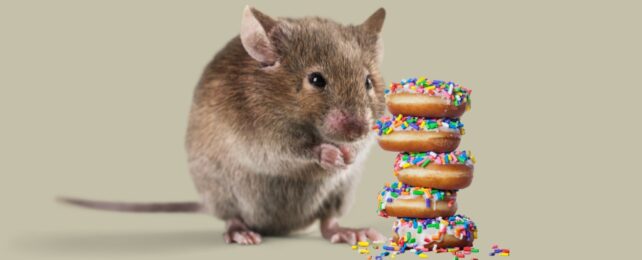
not so simple obviously and we have known this forever.
I am not sure this will lead to superior protocols. ,but the whole weight problem is recalcitrant. This screams new pathways to focus on
I will take stumbling into good science any day.
Mice That Eat Less Live Longer – And We May Finally Know Why
20 July 2024
https://www.sciencealert.com/mice-that-eat-less-live-longer-and-we-may-finally-know-why?
We've known for over a century that mice and rats live longer when they are fed less, but a new study reveals the secret might be an imbalance between energy consumed and burned, rather than a lack of energy or protein.
Researchers from the US and UK studied groups of mice put on identical diets, finding those housed in cooler environments lived longer and healthier lives. The important variance was that they had to use more energy to keep warm.
The findings imply confining research to energy intake by itself won't be enough to understand how diet affects health and aging, says the team led by nutrition scientist Daniel Smith of the University of Alabama at Birmingham and biological scientist Sharon Mitchell of the University of Aberdeen in Scotland.
It's a discovery that may one day allow people to reap the same longevity benefits without strict diets.
"It's not simply the caloric intake or the macronutrient or protein intake or any one component," Smith explained to Carolyn Beans for a PNAS Journal Club news story about the research.
"It is the interaction of those relative to the energy balance overall."
There's no consensus on the exact mechanism by which cutting back on calories is good for rodents' health and longevity.
One theory is that the advantages stem from just consuming less food or less of a particular macronutrient. Some research does indicate that eating less of some proteins might be a factor. It is also possible that a short-term energy imbalance during calorie restriction leads to long-term health gains.
If benefits come from reduced calorie and protein intake alone, health measures shouldn't vary between the different groups of mice if their food intake is the same, the researchers proposed. But if benefits come from having less available energy thanks to a need to keep warm, then lifespan and health should improve in the 'colder' mice if their food intake matches that of the 'warmer' group.
The study allowed groups of mice in warmer environments to eat unlimited food for 12 hours per day. Mice in cooler environments were 'pair-fed' to match the diet of their warmer counterparts, to make sure the groups got identical calories, protein, and other nutrients.
A short-term experiment studied mice kept at either 10 °C, 21 °C, or 30 °C for 11 weeks. Biomarker tests showed that the mice living in cooler environments experienced hormonal, metabolic, and physiological benefits. They lost weight quite rapidly too and they sustained this weight loss.
A longer experiment followed mice from 12 weeks old for the rest of their lives. Those kept at 22 °C lived about 20 percent longer than those fed the same but kept at 27 °C. Mice that lived in cooler cages were also healthier as they aged compared to the warmer mice, whose balance, coordination, and neurological function declined faster.
"Thus, energy balance (energy intake minus energy expenditure) was the primary contributor to the benefits observed," the team writes.
The cooler temperatures created an energy imbalance for this study without the effects being influenced by drugs or exercise, but cold itself may have its own influence. Of course, most humans won't find it practical to brave the cold to induce an energy imbalance, and we don't know if it's good for us.
The researchers wonder if other factors, like some medicines, could also improve health by throwing the body's energy out of balance. It remains to be seen if the popular GLP-1 analog drugs like Ozempic can achieve similar long-term health improvements.
"These results provide strong evidence that dietary energy intake alone is unnecessary for predicting the health and longevity benefits of sustained dietary interventions," the authors conclude.
No comments:
Post a Comment